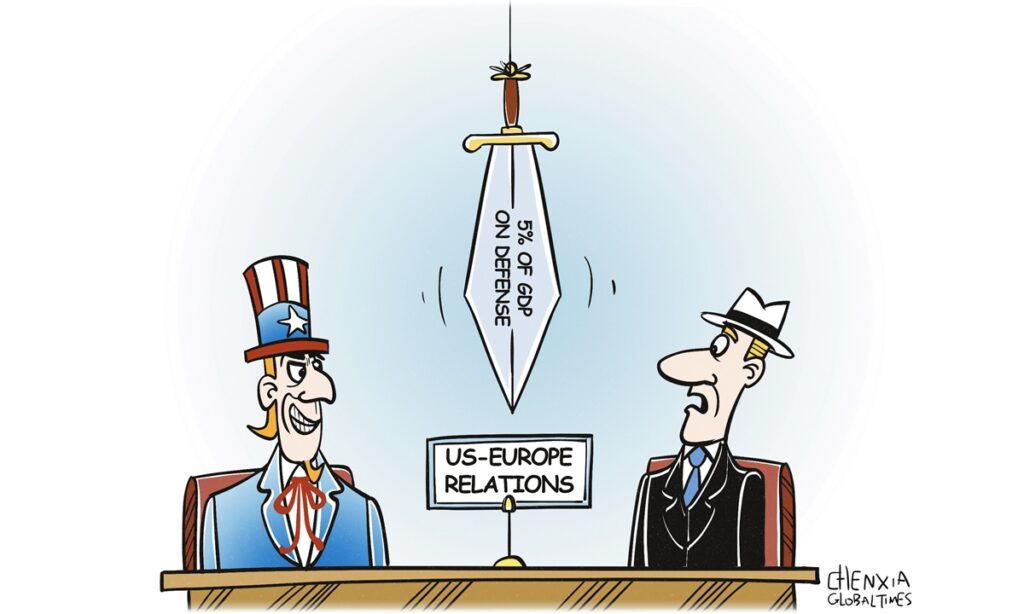Illustration: Chen Xia/GT
Before officially taking office, US President Donald Trump publicly said NATO countries should spend at least five percent of their GDP on defense, more than double the current two percent. With Trump’s inauguration on Monday, this sword of Damocles hanging over US-Europe relations is making Europe increasingly nervous.
Security is not only the core pillar of US-Europe relations, but also the source of many contradictions. The root cause lies in the deep strategic differences between the two sides. First, there is a difference in threat perception. Before the Russia-Ukraine conflict, the US had been at the forefront of taking a hard stance against Russia, while Europe viewed Russia as an unavoidable neighbor, leading to a longstanding gap in their respective policies toward Russia.
Second, the US and Europe handle the relationship between security and development differently. The US views military power and external military influence as key to safeguarding its interests. Meanwhile, Europe has enjoyed the peace dividend for a long time and is more inclined to invest resources into development and welfare, which has led to a lack of public support for increased military spending. Third, the US seeks to strengthen its influence over Europe on security issues, leveraging NATO to influence European foreign and security policies. Some political factions within the EU have recently been pushing for “strategic autonomy,” with defense autonomy as a core principle, resulting in an increasingly apparent struggle between the US’ desire for control and Europe’s desire for strategic autonomy.
Lastly, the US wants Europe to shoulder more responsibility for its own security without altering NATO’s leadership structure, thus alleviating the US’ strategic burden. However, the external pressures from the Russia-Ukraine conflict have reinforced Europe’s perception of NATO’s dominant role in European security, forcing Europe to deepen its reliance on US security and hope for more American support to ensure its own safety.
Thus, the ongoing disagreements between the US and Europe over the military spending target are essentially a microcosm of deeper security divisions, exposing underlying conflicts over values and interests between the two sides.
Faced with Trump’s threats, Europe is in a dilemma. On the one hand, achieving the five percent military spending target is difficult for Europe. Forcing the countries to meet the target could seriously strain Europe’s already fragile economy, worsening the ongoing economic and social difficulties. Moreover, much of the increased defense spending will flow into US defense contractors’ pockets, rather than promoting the development of Europe’s own defense industry, generating limited economic and social benefits within Europe. As a result, paying more “protection fees” to the US may not help promote European defense integration but could exacerbate the unequal relationship between Europe and the US.
On the other hand, Europe cannot afford the consequences of the US’ withdrawal from NATO. The Russia-Ukraine conflict has made Europe more acutely aware of its limitations in security affairs. For the foreseeable future, Europe will not be able to bear the fear of being detached from the US military umbrella. Therefore, although Europe is unable to meet the five percent target, it cannot afford to ignore the threat of withdrawal. Intensive communications between the US and Europe are expected to continue regarding defense spending, and a new target may be set during the NATO summit in The Hague in June. Even if Europe cannot meet the five percent demand, it will likely have to accept a target higher than the current two percent. A sharp rise in European defense spending may not necessarily benefit Europe’s security. On the contrary, the significant increase in defense spending by NATO’s European members is likely to provoke Russia’s vigilance and response. Given the hardened confrontation and severely damaged trust between Russia and the EU, such a move could easily lead to strategic misjudgments, intensifying tensions.
The author is the head of the European Security Program at the China Institutes of Contemporary International Relations. opinion@globaltimes.com.cn
Source link : http://www.bing.com/news/apiclick.aspx?ref=FexRss&aid=&tid=6791216a369348ff91bf9f2a5659bbb0&url=https%3A%2F%2Fwww.globaltimes.cn%2Fpage%2F202501%2F1327415.shtml&c=15040899824809632456&mkt=de-de
Author :
Publish date : 2025-01-22 08:46:00
Copyright for syndicated content belongs to the linked Source.
